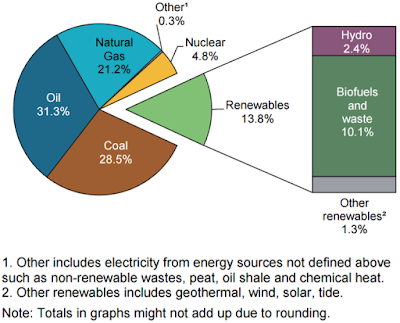I thought I'd expand more on my previous two posts on perovskite solar cells, as well as bringing in some other recent developments in the solar world that I've found quite interesting. But before that, here's a quick introduction to solar energy.
Solar energy has some phenomenal potential. A United Nations assessment calculated the 'Annual Solar Energy Potential' to be a minimum of 1,575 exajoules (1 EJ = 1018 joules) and a maximum of 49,837 EJ. The IEA calculated the global annual energy generation from all sources to be approximately 570 EJ... that's a lot less than what solar could generate.
It's fair to say then that availability of solar energy isn't exactly the problem, if anything, it's quite encouraging. And yet, solar currently accounts for about 1% of total electricity generation (see Figure 1 for total energy comparison), even when compared to other renewable energy sources such as hydropower and wind.
On the plus side, the growth in the solar sector has been incredible (see Figure 2), but it will need to grow a lot to reach the potential that many people believe it can. This ambition has seen developments in solar technology attracting increasing investment, and this, ultimately, is the driving force required to see solar energy proliferate.
Hydropower currently constitutes ~85% of global renewable electricity and yet has serious limits on further development, and ethical and environmental issues. Solar power is thus likely to be key in increasing renewable energy's contribution to the global energy mix. In order to harvest this potential we require considerable advances in solar technology.
My next post will look at how solar cells work.
Solar energy has some phenomenal potential. A United Nations assessment calculated the 'Annual Solar Energy Potential' to be a minimum of 1,575 exajoules (1 EJ = 1018 joules) and a maximum of 49,837 EJ. The IEA calculated the global annual energy generation from all sources to be approximately 570 EJ... that's a lot less than what solar could generate.
It's fair to say then that availability of solar energy isn't exactly the problem, if anything, it's quite encouraging. And yet, solar currently accounts for about 1% of total electricity generation (see Figure 1 for total energy comparison), even when compared to other renewable energy sources such as hydropower and wind.
 |
| Fig 1. 2014 fuel shares in world total primary energy supply |
On the plus side, the growth in the solar sector has been incredible (see Figure 2), but it will need to grow a lot to reach the potential that many people believe it can. This ambition has seen developments in solar technology attracting increasing investment, and this, ultimately, is the driving force required to see solar energy proliferate.
 |
| Fig. 2 Annual growth rates of world renewables supply from 1990-2014 |
Hydropower currently constitutes ~85% of global renewable electricity and yet has serious limits on further development, and ethical and environmental issues. Solar power is thus likely to be key in increasing renewable energy's contribution to the global energy mix. In order to harvest this potential we require considerable advances in solar technology.
My next post will look at how solar cells work.
Hey Baljeet, I’ve enjoyed reading your blog.
ReplyDeleteSurely the biggest problem with the idea of renewables still exists even if all of these new developments to solar and to renewables as a whole were to be successful. The issue being that relying on sources of energy with such varying output and that is so dependent on the natural conditions of where it's being produced is a poor alternative to non-renewable energy. When output can vary between locations, seasons and even day by day we would need to share electricity across the world and have to develop and invest into brand new infrastructure to handle this set up.
Hello Gaggan, thank you for taking the time to read my blog.
DeleteI agree that there absolutely are drawbacks and limitations with different renewable energies. And in a zero-emission future we would indeed likely require significant infrastructure changes to handle the different energy mix.
But what we shouldn't forget is that the current fossil fuel setup we are reliant upon is by no means perfect. Even if we ignore climate change, we have dangerously high levels of pollution in cities because of cars; the largest fossil fuel reserves are concentrated in a few countries (the UK not being one of them); the OPEC cartel controls 40% of global oil production; we have fuel stations all over the place containing hazardous petrol and diesel; we spend astronomical sums of money on exploration, extraction, transport and refinement and so on...
The drawbacks of fossil fuels were not addressed overnight, and many of them were accepted as reasonable costs for development and power. They also required, and still require to this day, massive subsidies from governments, paid for by taxes. We accommodate fossil fuels all the time, and so it's not too much to ask for renewables to also be accommodated. Renewables do not need to be perfect for them to replace fossil fuels.
ReplyDeleteAmazing Content! thanks for sharing this knowledgeable content with us,I have something useful to share with you regarding residential solar panel installation and you will love it and we want you to stay with us.